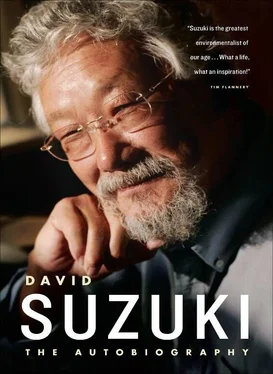
DAVID SUZUKI
THE AUTOBIOGRAPHY
With deepest gratitude,
I thank and dedicate this book to the general public,
who made my life's work possible.
You watched and listened to my programs;
you read, thought about, and responded to
ideas I expressed in writing.
Your support added weight and
visibility to my efforts and carried me past
numerous roadblocks and detractors.
That support has been a great honor, privilege,
and responsibility, which I have tried in my fallible, human
way to live up to.
My life and career in the university, research, and media
would not have been possible without the generous and enthusiastic
support of so many people in so many ways.
With all my heart, I extend thanks to:
My elders — Mom, Dad, Freddy, Harry
My anchor and the love of my life — Tara
The future — Tamiko, Troy, Laura, Severn, Sarika,
Tamo, Midori, Jonathan
The many students, postdocs, and associates who made my lab
such a vibrant, exciting, and productive community
The dozens of CBC radio and television staff, freelance researchers,
writers, and media professionals whose efforts have made me look good,
a job that Jim Murray reminded me is not easy
The hundreds of volunteers, staff, and associates who have made
the foundation such a supportive, joyful, and positive community
The tens of thousands of people who have contributed to
the foundation so generously
Elois Yaxley, for bringing some order to my life
Rob Sanders of Greystone Books and Patrick Gallagher
of Allen & Unwin Publishers for steadfast support and encouragement
Nancy Flight and Wendy Fitzgibbons for making this prose readable
And my kid sister Aiko, who taught me so much about life
and who died on the eve of 2006
IN 1986, THE year I turned fifty, I had the temerity to write Metamorphosis: Stages in a Life . It was not intended as an autobiography but as a series of essays. My publisher encouraged me to supplement the pieces with more and more personal material, until the essays were reduced to three at the end of the book. To my astonishment and delight, people were interested in my experiences, and the book sold more copies than any other I have written. At the time, at the relatively young age of half a century, I didn't feel I had matured enough to have a perspective on my life. Now, two decades later, I know I was still a child in maturity, and even now, looking in the mirror, I have difficulty reconciling the old man gazing back at me with the still-young person in the mind behind the face.
Although all people on Earth, as members of one species, share the same anatomy of the brain, the same chemistry of neurons, and similar sense organs, each of us “perceives” the world in a very personal way. We experience it through perceptual filters that are shaped by our individual genes and experiences, by our gender, ethnic group, religious background, socioeconomic status, and so on. Essentially, our brains “edit” the input from our sensory organs, “making sense” of it within the context of our personal history and the values and beliefs we have come to acquire.
Now, as my aging body imposes limits and tells me to slow down, I spend more time in reflection, trying to put my most memorable experiences into a kind of order. It's the way scientists write up a research report or paper: we follow different avenues of inquiry, going down blind alleys, hitting a fast lane or taking a shortcut, zigzagging along as we probe an interesting observation or phenomenon. Then, when it's time to “write it up,” we shuffle through the experiments, tossing some out and organizing the remainder into an order that creates the illusion that a direct path was taken from the initial question to the final results.
So it is with my life story. I don't have a photographic memory (thank god), and certain events that might have passed unnoticed by someone else may have stuck in my mind, whereas other, seemingly more monumental moments have faded away. This, then, is a story I have created by selectively dredging up bits and pieces from the detritus of seventy years of life. The first five chapters skim over the first fifty years, giving a somewhat different emphasis from that of Metamorphosis and offering some different information about those years, and the rest of the book describes events since then.
Why would anyone else be interested in my life? I know people like to delve into the hidden parts of the lives of people who have acquired some notoriety, hoping to find juicy bits of gossip, signs of weakness, or faults that bring the subjects down off pedestals, or simply to expand on what one knows about a public figure. It's not my intention to satisfy that curiosity. Instead, as an “elder,” I hope my reflections on one life may stir a reader to consider those thoughts in relation to his or her own life.
ONE
MY HAPPY CHILDHOOD IN RACIST BRITISH COLUMBIA
JAPANESE IMMIGRANTS BEGAN arriving in Canada in great numbers at the end of the nineteenth century, lured by the tremendous abundance of land, fish, and forests that promised money. Small, diligent, smelling of strange foods, speaking heavily accented English, these Asian newcomers seemed to be another kind of human being, willing to live in cramped quarters and squirreling away their hard-earned money. Laws were passed to bar them from voting, purchasing land, and enrolling in universities.
Like many other Japanese, my maternal and paternal grandparents came to Canada less because they wanted to make a new life than because in Japan they were locked into extreme poverty. I cannot imagine the terrible conditions that made them take the chance to come to a country that regarded them and treated them as belonging to a kind of subhuman race. Japan was their home, and their intent was to return to it when they had made their fortune. But it was a journey to a distant land with no assurances they would ever return. After my birth, my father's parents never went back to Japan, and my mother's parents returned only after World War returned only after World War II, disillusioned by their treatment in Canada. They went back to Hiroshima, and both were dead in less than a year.
My grandparents started their lives in Canada with little more than hope and a willingness to work. They had no formal education, spoke no English, and were of a culture totally alien to Canadians of the day, who had different attitudes and perspectives about everything from family to customs. Like the waves of immigrants who have come to this place over the past two centuries, my grandparents saw Canada as a land of opportunity and plenty. There is a story that neatly encapsulates this belief. Two immigrants arrive in Canada on a Sunday and take a stroll together along the street. One of them looks down and spots a twenty-dollar bill, which he bends to pick up. He's stopped by his friend, who tells him, “Leave it there; we'll start work tomorrow.”
Today I watch the Chinese family that operates the corner store, the Punjabi cab driver working long, hard hours, and the Mexican itinerants picking vegetables; all doing jobs that few Canadian-born folks are willing to endure, they are part of the stream of immigrants like my grandparents who have enriched what has become a highly multi-cultural society. They bring to it their vigor and their exotic practices, languages, and beliefs. But in the early part of the last century, there were no constitutional guarantees in this country.
Читать дальше



![David Jagusson - Devot & Anal [Hardcore BDSM]](/books/485905/david-jagusson-devot-anal-hardcore-bdsm-thumb.webp)









